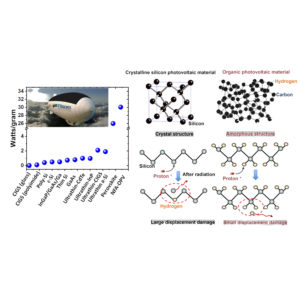
The demand for lightweight, mechanically and radiation resilient solar power sources has grown in recent years due to their increasing use in space applications such as satellites, autonomous vehicles and robots, and space suits. Organic photovoltaic (OPV) cells have shown promise in meeting these demands. The development of non-fullerene acceptors (NFAs) has allowed OPV power conversion efficiencies (PCE) to exceed 20% under 1 sun, AM 1.5G illumination. Compared to other photovoltaic technologies, OPVs have a specific power of over 30 kW/kg. In particular, we recently discover that OPV cells exhibit remarkable tolerance of proton energy up to 1 MeV proton radiation at fluence of up to 1012 cm^-2, with no detectable degradation on device performance. This exceeds the reported performance of crystalline silicon cells, which show approximately 40% degradation. In this project, our primary objective is to identify significant failure mechanisms and origins of organic photovoltaic materials under proton irradiation, with a specific focus on NFAs containing multiple polarized C=C bonds, C-N, and thiophene units. Previous research has shown that these systems have shorter lifetimes than pure hydrocarbon systems with only C-H, C-C, and non-polarized C=C bonds. Our program will investigate a range of high efficiency polymer, small molecule NFA, and fullerene-based systems to determine where the islands of stability exist in these materials, as well as their dependence on materials purity, chemical structure, and deposition conditions (solution vs. vapor film growth). This project is a collaboration between the Departments of Electrical Engineering and Computer Science and the Department of Climate and Space Sciences and Engineering. This collaboration will empower a diverse community of researchers to find practical solutions to the most challenging problems for space photovoltaic energy research.
People

Yongxi
Li
ECE
Engineering

Susan
Lepri
CLaSP
Engineering
Funding

Funding: $30K (2023)
Goal: The goal of this study is to identify the factors that lead to long term chemical stability of organic semiconductors under proton radiation, develop “design rules” based on this understanding, and ultimately create OPV devices with high specific power and reliability.
Token Investors: Yongxi Li and Susan Lepri
Project ID: 1116
